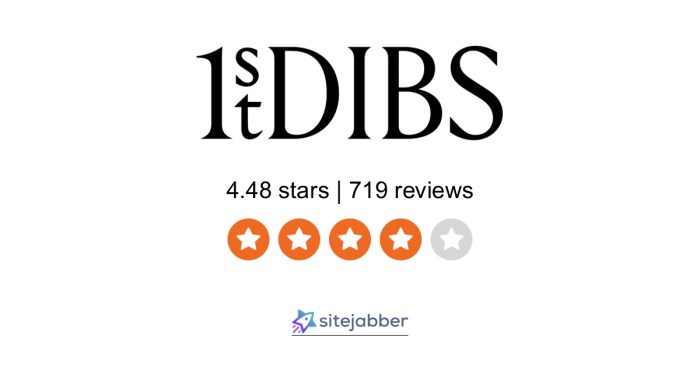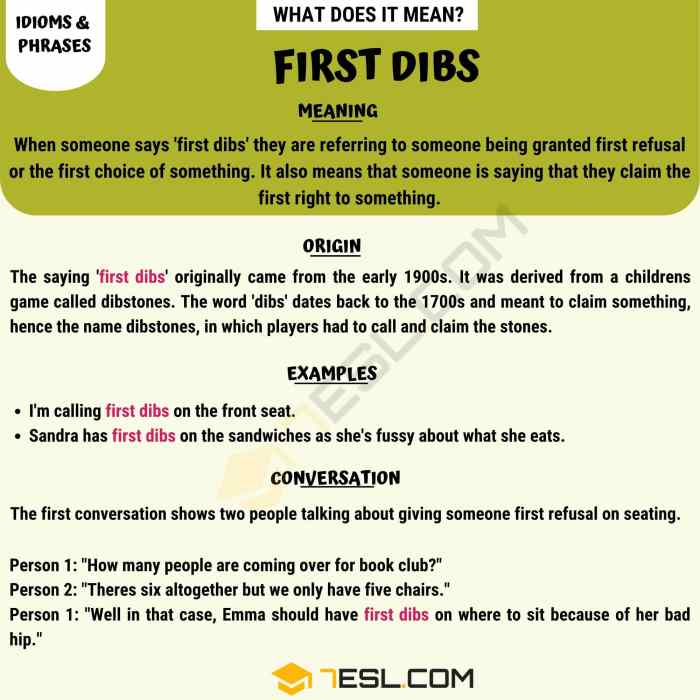Forst dibs – From its origins as a colloquial expression to its legal significance and social implications, “first dibs” has emerged as a fascinating concept that shapes our interactions and expectations. This comprehensive guide delves into the multifaceted nature of first dibs, exploring its historical evolution, legal implications, social norms, and strategic nuances.
The concept of first dibs has permeated various aspects of our lives, from informal agreements among friends to formal contracts in business settings. Understanding its origins, implications, and etiquette empowers us to navigate these situations effectively, fostering positive relationships and ensuring fairness in claiming and negotiating priority.
Origin and History of the Term “First Dibs”

The phrase “first dibs” is a colloquial expression used to indicate the right or privilege of selecting something before others.
The term “dibs” is derived from the Middle English word “dibbes,” which means a small portion or share. It was originally used in the context of dividing up food or other resources among a group of people.
Historical Usage and Evolution
The phrase “first dibs” first appeared in the early 19th century, and it has since become a common expression in both British and American English.
Over time, the meaning of “first dibs” has expanded to include any situation in which someone has the right to choose something before others.
Examples of Usage
Here are some examples of how the term “first dibs” is used in different contexts:
- “I called dibs on the last slice of pizza.”
- “The CEO has first dibs on the new office space.”
- “I have first dibs on the next promotion.”
Legal Implications of “First Dibs”
In the realm of law, the term “first dibs” carries varying legal implications depending on the jurisdiction and the context in which it is invoked. While it may convey a sense of priority or entitlement in informal settings, its legal significance is often limited and subject to specific legal doctrines and principles.
One notable legal concept related to “first dibs” is the “right of first refusal.” This right grants an individual or entity the exclusive option to purchase or acquire a particular asset or property before it is offered to the general market.
The right of first refusal is typically established through a contractual agreement and can be enforced in court if violated.
Limitations and Exceptions to “First Dibs” Claims
Despite the potential legal implications of “first dibs” and the right of first refusal, there are several limitations and exceptions that can impact the enforceability of such claims. These include:
- Lack of a legally binding agreement:If “first dibs” is merely an informal understanding or expectation, it may not be legally enforceable without a written contract or other evidence of a binding agreement.
- Good faith and fair dealing:Even in cases where there is a right of first refusal, the parties involved are expected to act in good faith and not engage in unfair or deceptive practices.
- Preemption by other legal doctrines:In certain situations, other legal doctrines, such as the doctrine of equitable estoppel or the statute of frauds, may take precedence over “first dibs” claims and limit their enforceability.
- Statutory exceptions:In some jurisdictions, there may be specific statutory provisions that limit or prohibit the enforcement of “first dibs” claims in certain circumstances, such as in the context of real estate transactions.
Social and Cultural Aspects of “First Dibs”

The social and cultural norms surrounding “first dibs” vary across different societies and cultures. In general, claiming “first dibs” is seen as a way to establish priority or ownership over a particular item or opportunity. However, the etiquette and expectations associated with claiming “first dibs” can vary depending on the context.
In some cultures, claiming “first dibs” is considered a polite and respectful way to indicate interest in something. For example, in a group setting, someone might say “first dibs on the last slice of pizza” to politely express their desire for it.
In other cultures, claiming “first dibs” can be seen as more assertive or aggressive, and may be met with resistance or even hostility.
Etiquette and Expectations
The etiquette and expectations associated with claiming “first dibs” can vary depending on the context. In general, it is considered polite to claim “first dibs” in a clear and direct way, but without being overly aggressive or demanding. It is also important to be respectful of others’ claims to “first dibs,” and to be willing to negotiate or compromise if necessary.
For example, in a group setting, someone might say “first dibs on the last slice of pizza, but only if no one else wants it.” This shows that the person is willing to give up their claim to “first dibs” if someone else expresses a stronger desire for the item.
Social Consequences
Asserting or denying “first dibs” can have potential social consequences. For example, claiming “first dibs” on something that someone else has already expressed interest in can lead to conflict or resentment. Similarly, denying someone’s claim to “first dibs” can be seen as rude or disrespectful, and can damage relationships.
It is important to be aware of the potential social consequences of asserting or denying “first dibs,” and to act in a way that is respectful of others’ feelings and desires.
Strategies for Claiming and Negotiating “First Dibs”
Claiming and negotiating “first dibs” effectively requires a combination of tact, assertiveness, and respect for others’ interests. Here are some strategies to consider:
Expressing Your Interest Clearly
When expressing your interest in something, be direct and clear. Avoid vague language or assuming that others will understand your intentions. Use phrases like, “I’d like to claim first dibs on this item” or “Can I put my name down for this opportunity?”
Establishing a Time Frame
Setting a specific time frame for your “first dibs” claim can help prevent confusion or misunderstandings. This could be a specific date or time, or a duration (e.g., “I’d like to have first dibs for the next week”).
Being Respectful of Others
Remember that “first dibs” is a social convention, and not a legal right. Be respectful of others’ interests and expectations. If someone else has already expressed an interest, consider offering a compromise or exploring alternative options.
Negotiating and Resolving Conflicts
In the event of conflicts over “first dibs” claims, negotiation is key. Be willing to listen to others’ perspectives and find a mutually acceptable solution. This could involve adjusting the time frame, offering a trade, or agreeing to a lottery system.
The exclusive opportunity to acquire something before it becomes available to the general public is known as “first dibs.” Bracusi , a renowned art gallery, frequently provides its patrons with this privilege, allowing them to secure unique and sought-after artworks.
This exclusive access enhances the collecting experience and ensures that discerning collectors have the first opportunity to acquire exceptional pieces that align with their aesthetic preferences.
Maintaining Positive Relationships
While asserting your “first dibs” claim, it’s important to maintain positive relationships with others. Be polite, considerate, and avoid creating unnecessary tension. If you’re unable to reach an agreement, don’t hold a grudge or let it affect your interactions with others.
Alternatives to “First Dibs”: Forst Dibs

While “first dibs” is a commonly used phrase to express priority or preference, there are several alternative ways to convey the same idea. These alternatives may have different connotations or be more appropriate in certain situations.
Synonyms
Some synonyms for “first dibs” include:
- First choice
- First pick
- Priority
- Preference
- Right of first refusal
These terms all convey the idea of having the first opportunity to choose or claim something. However, they may be more formal or specific than “first dibs.” For example, “right of first refusal” is a legal term that gives someone the exclusive right to purchase a property before it is offered to the general public.
Phrases, Forst dibs
In addition to synonyms, there are also several phrases that can be used to express the concept of “first dibs.” These phrases may be more informal or colloquial than synonyms, but they can still be effective in conveying the desired meaning.
- I want to be first in line.
- I’m calling dibs on that.
- I’ve got my eye on that.
- I’m saving that for myself.
- I’m not letting anyone else have that.
These phrases are all clear and concise, and they can be used in a variety of situations. However, they may not be as appropriate in formal or professional settings.
Advantages and Disadvantages
Using alternative phrases to “first dibs” can have several advantages. First, it can help to avoid confusion or misunderstanding. For example, the phrase “first choice” is less ambiguous than “first dibs,” which can also refer to the right to choose first in a game or activity.
Second, using alternative phrases can help to create a more positive or professional tone. For example, the phrase “I’m calling dibs on that” can be seen as assertive or even aggressive, while the phrase “I’m interested in that” is more polite and respectful.
However, there are also some disadvantages to using alternative phrases to “first dibs.” First, these phrases may not be as well-known or understood as “first dibs.” This could lead to confusion or misunderstanding, especially in informal settings.
Second, alternative phrases may not be as concise or easy to say as “first dibs.” This could be a disadvantage in situations where time is limited or where brevity is important.
Appropriate Situations
The best alternative to “first dibs” will depend on the specific situation. In general, it is best to use a phrase that is clear, concise, and appropriate for the context.
For example, in a formal setting, it is best to use a more formal phrase such as “first choice” or “right of first refusal.” In an informal setting, a more casual phrase such as “I’m calling dibs on that” or “I’ve got my eye on that” may be more appropriate.
Creative Uses of “First Dibs”
The term “first dibs” has been used in various creative and unconventional ways, often extending beyond its traditional meaning. These uses can evoke humor, satire, or metaphorical significance, adding depth and nuance to the concept.
In Art and Literature
In art, “first dibs” may represent the artist’s initial claim to a subject or theme, establishing their ownership or perspective on the matter. It can also be used as a playful or ironic reference to the artist’s creative process.
In literature, “first dibs” can serve as a literary device, creating tension or conflict within a narrative. It can foreshadow future events, hint at hidden desires, or explore the dynamics of power and privilege.
In Popular Culture
In popular culture, “first dibs” has been used in a variety of contexts, from television shows to music lyrics. It can be employed to create humor by exaggerating the importance of claiming something first, or to satirize the competitive nature of society.
For example, in the popular sitcom “Seinfeld,” the character George Costanza infamously declares “first dibs” on a piece of cake, demonstrating his obsessive and often ridiculous need to be first in line.
End of Discussion
Whether asserting our right to the best seat in the house or negotiating a favorable business deal, understanding the dynamics of first dibs provides us with a valuable tool for navigating social and professional interactions. By embracing the principles of fairness, respect, and effective communication, we can leverage the power of first dibs to build strong relationships and achieve mutually beneficial outcomes.



